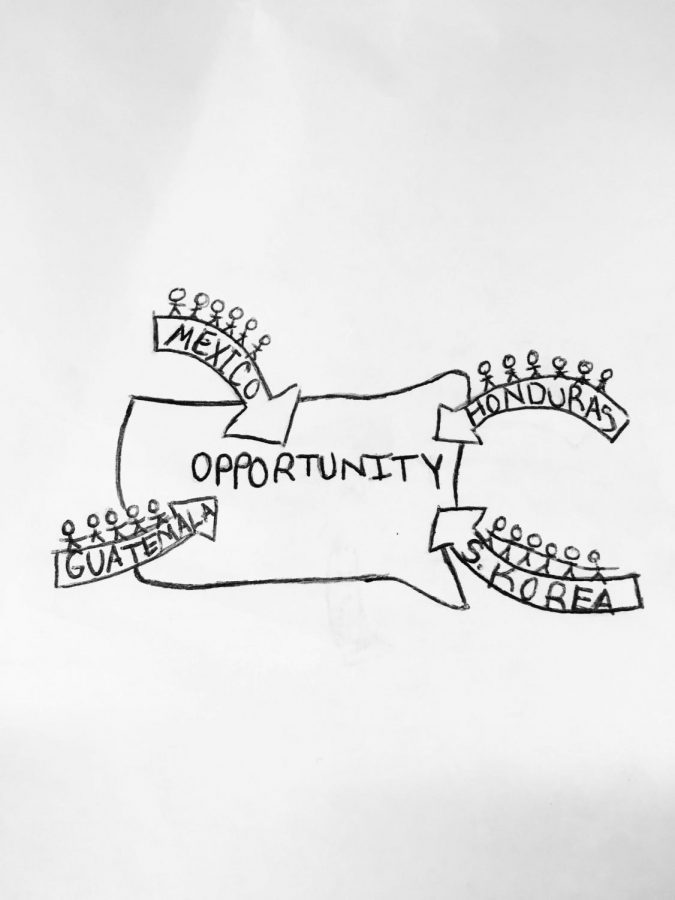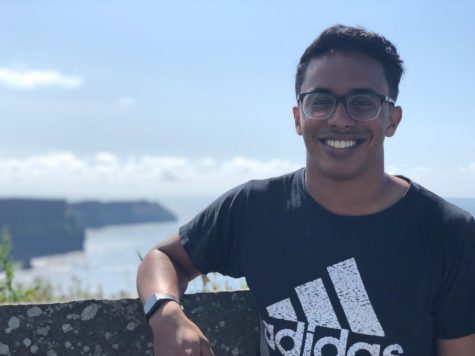Deferred Action for Childhood Arrivals
What is it and how will it affect students?
Many people emigrate from different countries in search of opportunity in America.
February 9, 2018
The new year brings hope to many. It’s time when people start fresh and make goals… that are often unattainable. For 800,000 people the new year brings a new feeling of dread.
President Trump made a statement this year, announcing that the DACA program (Deferred Action for Childhood Arrivals) will be terminated. After March 5, 2018 DACA renewals may not be accepted. However, most people in the DACA program will not be considered illegal until their two year license runs out. According to the New York Times, the Trump administration hopes that this strategy will completely terminate the program by October 2019.
The termination of DACA is an issue that affects all of us, not just members of the program. The people in DACA are our neighbors, our friends, and our co-workers. Shoreline has recognized the importance of this issue; the superintendent released a message concerning DACA on September 14.
Superintendent Rebecca Miner, in her statement to district said, “ In short it (DACA) will not change how or who we serve in our community. Shoreline Public School staff members will continue to work very hard every day to provide a welcoming and supportive environment for ALL of our families and students.” This message was affirmed by Dr. Tanisha Felder, director of Equity and Family Management.
School districts across the country have their own approach to the DACA situation. Without guidelines from the Trump administration, school districts are relying on each other to create policies.
Shoreline Public School’s Public Information Officer, Curtis Campbell said via email, “ School communications staff from around the region have shared each others’ messages in hopes that it helps districts who were developing or considering similar messages for their school communities.”
This is the DACA story of Edith Bringas, a former Shorewood grad from the class of 2014. Bringas was born in a small, poor town in Mexico. It didn’t have utilities or a good education system. School was far away from her house, and she had to walk a long time to get there.
Bringas started working when she was 7 years old. She sold candy to provide financial support for her aunt. This a common occurrence in Mexico, where family holds high priority. The US, on the other hand, has a consumerist culture, Bringas said.
Bringas believes that this culture extends Mexican immigrants. She said, “Mexican people are treated like items. America puts a price us.”
Bringas illegally immigrated to America when she was 9 years old. She first stopped in Los Angeles. As a new immigrant, LA was an easy city to navigate. It has large population of Spanish speakers, so communication was not obstacle. After some time in LA, she moved to Seattle, a city that doesn’t have very many Spanish speakers. Everyday tasks and interactions became awkward for Bringas because of the language barrier. Bringas and her family were ridiculed on the Metro for not speaking English, she said.
After some time and a lot of struggle, Bringas learned English and assimilated into American society. Her parents had a much tougher time getting used to America. Bringas’s mom was an active member of a community in Mexico. She advocated for better education in her village. When she moved to America she became reserved. Her mother faced workplace harassment, because she wouldn’t speak English.
This resentment and hatred for Mexican workers stems from the stereotypes that are associated with them. Bringas says that Mexicans are often viewed as menial workers. A common stereotype illustrates Mexicans as workers at McDonalds; many immigrants’ first jobs are in fast food chains.
Bringas’s personal experience has proven this stereotype to be untrue. To make extra money during her freshman year of college, Bringas cleaned houses.
Bringas said, “When I cleaned houses with other Mexican women, I learned about their lives before they came to America. They used to be dancers, musicians, and teachers in Mexico.”
She argues that many Mexican immigrants are more complex and intellectual than their stereotypes suggest. Bringas studies physics as a junior at the University of Washington.
With the end of DACA on the horizon, these Mexican immigrants may not be able to contribute to America anymore.
Bringas has tried to take a positive attitude on this issue. She feels like the American people will come to support DACA members and overturn the current ruling.
DACA already has a strong support base. Tech giants such as Google, Facebook, and Microsoft have stood up against the ruling. Bringas herself has participated in activism for immigrant issues and DACA.
If her DACA membership ends, she might have to return to Mexico. Bringas believes that she can use her education and experience in the U.S to make a good life in Mexico. But she still hopes that she can stay in America.
Bringas said: “ I don’t know. I feel like magic is going to happen, and the termination of DACA is going to be repealed by lawmakers and the people of America.”



